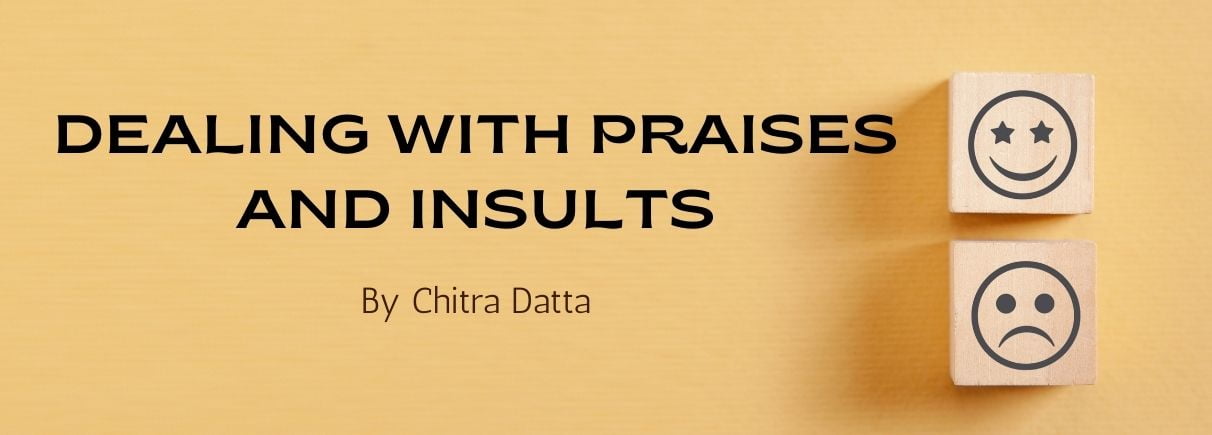Dealing with Praises & Insults

Most of us will wonder, “What is the big deal in dealing with praises and insults??” The more we get, the better. However, insults can be a significant problem in our lives. After all, who in this world truly wants to face insults? Understanding the impact of words and the emotions they evoke is crucial.
But the crux of the matter is not so simple. Lord Krishna, in the second chapter of the Bhagavad-Gita, tells Arjuna that the battlefield of life is fraught with challenges, including how we perceive and react to both praise and criticism. Understanding this profound lesson can change our approach to daily encounters.
We meet different people in this world. Some are rude, some gentle, some compassionate, some ruthless, some friendly, and some reserved. Everyone behaves according to their nature and past experiences. Recognizing that we are all products of our environments helps us to better understand why people react the way they do.
When a person praises us, it often reflects that individual’s positive outlook on life, revealing their ability to see good in others. This perspective can be transformative, encouraging us to reciprocate with kindness. Conversely, when someone criticizes us, it says more about their tendency to find faults than it does about our actual shortcomings, serving as a reminder to practice empathy.
Even if we do good, there will always be someone who points a finger at us. Therefore, instead of brooding over their behavior, Lord Krishna advises Arjuna to cultivate tolerance and resilience. Embracing this mindset can help us maintain our peace amid chaos, allowing us to rise above negativity.
The problem with us is that we often dwell on negative incidents, creating deep impressions on our minds. This mental clutter can lead to anxiety and stress, manifesting in various health issues. Acknowledging this cycle can empower us to break free from it and find healthier coping mechanisms.
Those who strike us with harsh words often move on, leaving us feeling like wounded soldiers. Ultimately, we suffer because we hand over our emotional well-being to the opinions of others. By recognizing this, we can reclaim our happiness and take control of our emotional responses, ensuring they are not dictated by external factors.
We should let go of these incidents from our minds. The more we discuss and dwell on them, the stronger our emotional reactions become. Lord Krishna encourages Arjuna to develop tolerance, as these events will occur regardless of our preferences. With each instance we endure, we fortify our mental resilience and emotional stability.
The underlying issue is our attachment to praise and insults. This attachment colors our perceptions and influences our emotional responses, making it crucial to cultivate a mindset that prioritizes inner peace over external validation.
With the social media taking center stage in our lives, we have become increasingly dependent on likes and validation through the ‘thumbs up’ symbol. The more the likes, the more elated we feel. Unfortunately, this dependence can lead to feelings of worthlessness when likes dwindle, highlighting the need for self-acceptance and validation from within.
This phenomenon is particularly evident among celebrities. To maintain their youth and beauty, many resort to Botox, plastic surgery, and other artificial enhancements. Such measures often overshadow their natural beauty, leading to a destructive cycle of seeking validation that can ultimately be detrimental to their mental health.
The day these superficial enhancements cease to be effective, and public opinion shifts, many find themselves spiraling into depression. Lord Krishna, therefore, emphasizes the importance of tolerating both praises and insults, as they are part of the human experience.
If we become overly elated with praise, we risk falling even harder when criticism arises. As the saying goes, ‘The higher we climb, the steeper we fall’, and a severe critique can drown us in despair if we have not developed a healthy perspective on our self-worth.
Lord Krishna advises maintaining balance in our reactions to praises and insults. Neither should we become too elated when praised nor too dejected when criticized, as these reactions are often shaped by the perceptions of others, which can be fickle and subjective.
Lastly, engaging in activities that promote self-growth, such as volunteering or pursuing hobbies, can shift our focus from seeking external validation to deriving satisfaction from our contributions and passions. This shift in focus can enhance our resilience and overall happiness.
Building a strong support system is also vital. Surrounding ourselves with positive influences who encourage us to see beyond the superficial can help us maintain perspective. Friends and family who value us for who we are, rather than for our achievements or appearances, can reinforce our self-worth.
Furthermore, engaging in self-reflection can provide insight into how we react to external validation. Keeping a journal where we document our thoughts and feelings can illuminate patterns and help us identify triggers that lead to emotional upheaval, paving the way for healthier responses.
To further enhance our understanding, it is essential to consider practical strategies that can help us navigate this complex emotional landscape. For instance, practicing mindfulness can equip us with tools to observe our thoughts and feelings without becoming overly attached to them. This awareness allows us to respond to praises and criticisms with greater equanimity.








Hare Krishna Mata ji,
Dandvat Pranam,
It is a wonderful content with some of the best quotations from Our Bhagavad Gita.
It is written in an very effective and précised way & the topic in itself is too good, atleast for me being a neophyte devotee. Cultivation of such tolerance is a must though it is quite a tough job. Thank you for sharing such good piece of knowledge.